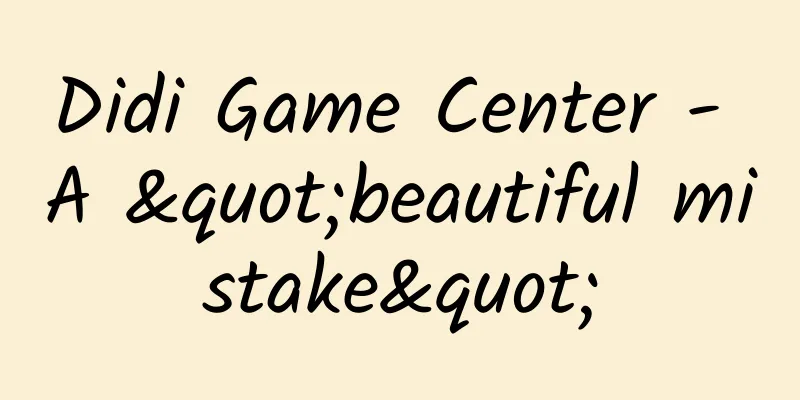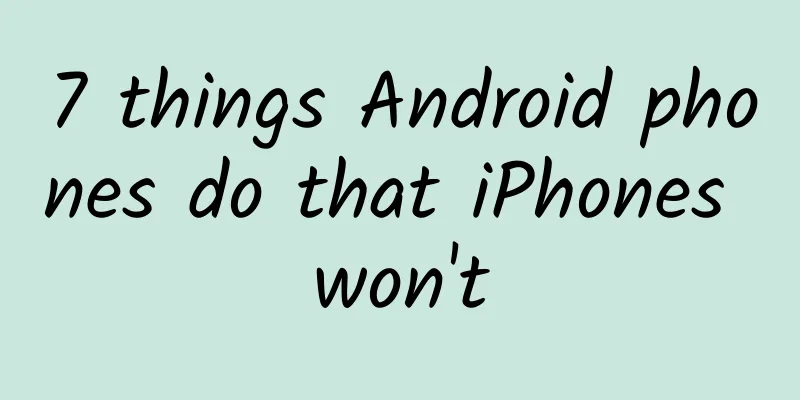Didi Game Center - A "beautiful mistake"

|
I believe everyone already knows: Didi issued an announcement yesterday, saying that due to the company's business adjustments, Didi Game Center will cease operations in two months. This means that the game center, which has been online for less than half a year, has been officially declared dead. For Didi's public relations team, which has always acted in a high-profile and high-profile manner, how to properly handle this news has become a thorny problem: it is necessary to ensure that the message is effectively conveyed, but at the same time, it does not want to cause excessive interpretation and speculation. The situation is better than expected. Among the overwhelming news, most of them quoted Didi’s official suspension announcement in large sections, but did not mention or interpret why Didi stopped operating or the reasons behind the suspension. I learned from a friend in the gaming industry around March or April this year that Didi was going to make games. I was quite surprised to hear the news at the time. After all, for a travel company without gaming genes, it would probably be a hobby to rashly get involved in the gaming field. But when the Didi Game Center was officially launched, after experiencing it myself, I felt that this product would definitely not last long. Sure enough, in less than half a year, the Didi Game Center ceased operations. Now I can talk about my views at the time - looking back now, it was obviously correct. First of all, it is logically wrong. Any Internet product is about scenarios. The original intention of Didi Game Center is to solve the boredom of waiting for the car from the time when the car is called to the time when the car is boarded. It seems to make sense - since you are bored, why don't I give you some games to play? This is just like some NBA2K games that allow users to practice shooting during the loading process. Killing time is to improve user satisfaction. This is always politically correct. In this case, launching a game center seems to be the meaning of the topic. So Didi Game Center was launched. But if you think about it carefully, the logic of the two is contradictory: the taxi app itself is to improve the efficiency of travel. The ideal state is to call a taxi in one second, someone will answer the next second, and the car will stop in front of you within 30 seconds, and then you can get on the car calmly. In this process, where is the time to play games? Didi’s launch of the game center is equivalent to a disguised admission that its service capabilities are not enough. Users need to wait a long time for the car. In this case, killing boring time has become a rigid demand, so games are needed to make up for this scenario. He Caitou said the following in "Why Not Go to Baidu Baike", which can be applied to Didi. I will quote it: Baidu is a search engine company, and the nature of search engines is to take and run. Users come quickly, find content, and leave. The more successful a search engine company is, the shorter the time a user spends on a single visit should be - this means that users can find the content they want in the shortest time, which reflects the company's greatest value. Creating content is the exact opposite. The longer users stay on the page, the better. The more pages they browse, the better. This shows that your content is valuable and users are willing to continue reading. The problem is: Baidu gives people the impression that it is a grab-and-go. Why do users think they can spend an hour here? No one orders an aperitif at a fast food restaurant. Therefore, we can also see such a scenario: domestic taxi apps, including Uber, AA, Shenzhou, and Yidao, have not launched game centers, but Didi has. For such a product that dares to make fun of itself and slap itself in the face logically, competitors must be quite impressed. As for content, H5 is out of the question Didi now has nearly 200 million users, with 12.17 million orders per day during peak hours, and this was a few months ago. For a company with such a huge amount of traffic, any monetization model can be amplified geometrically due to the huge user base, whether it is e-commerce, finance, or games, in theory, it can all be established. The essence of mobile Internet is traffic, and even if you sell this traffic, you can get good returns, the most typical example is Cheetah, so why did Didi still fail? This brings us to the second topic, which is the selection of game types in Didi Game Center. According to official data, Didi Game Center currently has 35 games, including "Girls Fighter", "Foolish Old Man Moves Mountains", "Crazy Hanging Legend", "Throwing Paper Balls", "Remove Blocks", etc. These games are all HTML5 (H5 for short) games. Maybe you don't know what H5 games are. Simply put, they are mobile web games. For example, have you played "Surround the Crazy Cat" and "Don't Step on the White Block"? The biggest feature of H5 is that you don't need to download, you can just click and play. Although H5 is convenient, it also has obvious problems. First, the graphics are very poor, which is determined by the engine. In fact, the most important reason is that the payment ability of H5 games is too weak and can be almost ignored. For example, the most successful H5 game "Foolish Old Man Moves Mountains" has a turnover of only two million, while it is very common for a well-made mobile game to have a turnover of over ten million. Therefore, even if Didi, which has 200 million users, smashes users into the black hole of H5, it still cannot make money. Imagine if Didi Game Center, 360 Mobile Assistant, and Wandoujia become a game/application distribution channel, with a turnover of hundreds of millions a month, even if the logic is not sound, as long as it makes money, will Didi stop operating it? Therefore, Didi Game Center was a product doomed to fail from the very beginning when it was launched. It was neither a returnee nor a passer-by. It was simply a beautiful mistake made by Didi during its crazy expansion. As a winner of Toutiao's Qingyun Plan and Baijiahao's Bai+ Plan, the 2019 Baidu Digital Author of the Year, the Baijiahao's Most Popular Author in the Technology Field, the 2019 Sogou Technology and Culture Author, and the 2021 Baijiahao Quarterly Influential Creator, he has won many awards, including the 2013 Sohu Best Industry Media Person, the 2015 China New Media Entrepreneurship Competition Beijing Third Place, the 2015 Guangmang Experience Award, the 2015 China New Media Entrepreneurship Competition Finals Third Place, and the 2018 Baidu Dynamic Annual Powerful Celebrity. |
<<: Is cross-border mobile phone use “innovation” or “fun”?
>>: Buy, buy, buy or develop independently? Where is the future of China's "chips"?
Recommend
Laying the foundation for the rapid development of mRNA vaccines: Interpretation of the 2023 Nobel Prize in Physiology or Medicine
Xinhua News Agency, Beijing, October 2 (Reporter ...
How to create a Douyin account? Introduction to Douyin operation methods
Nowadays, short videos are in a very fierce compe...
No traffic in the live broadcast room? 6 ways to increase your traffic!
Why is there no traffic in your live broadcast ro...
Which cards did the “all-powerful” WeChat break?
[[124892]] Alibaba Chairman Jack Ma's words &...
A comprehensive review of China's mobile internet advertising in 2019
The most important turning point is that with the...
A must-read list for operators in 2018! !
Unconsciously, 2017 has come to an end. What kind...
How can operations move from the extensive stage to the refined stage?
Last week I went to Didi and was invited to talk a...
Operation DEMO: The principle and application of RFM user value model
Among the many user value analysis models, the RF...
Microalgae: Eats carbon dioxide and spits out bio-oil
Science and Technology Daily reporter Yong Li and...
5 tricks and classic cases of leveraging marketing during National Day!
The National Day is coming, and operators are alr...
Some pretend to be shit, some pretend to be dead, you frogs are really cunning! | Nature Trumpet
Welcome to the 45th issue of the Nature Trumpet c...
Gree mobile phone passed the Ministry of Industry and Information Technology registration and its complete configuration was exposed for the first time
[[131068]] On April 1, data from the Ministry of ...
2021 CPA Money-Making Project Training Camp, where beginners can earn 200-1000 yuan per day
2021 Hand-in-hand teaching you how to play the CP...
Unintelligent "smart drugs", back off! Back off! Back off!
"Take one pill before the exam, and you'...
4 key points for an excellent event planning!
When it comes to event planning , perhaps in many...









